Enhancing sales performance through negotiation skills
Executive Summary
In today's business era, it is a given that to be effective, salespeople need to embrace the art of negotiation. However, there have been few studies that demonstrate the impact of negotiation skills development on sales performance and business results. A recent study was designed to assess the impact of a sales performance improvement process created around Wilson Learning's Negotiating to Yes (NTY) workshop.
The effectiveness of NTY was clearly demonstrated in our study of a large U.S. company that provides a variety of environmental services to industrial clients (hazardous waste disposal, site cleanup services, etc.). The results showed:
- Positive improvement in all skills and performance outcomes
- That 53% of the total revenue value (approx. $2.5 million/year) of individual sales opportunities was attributed to negotiation skills acquired in the improvement process
- That NTY had the greatest impact on improvement in client relationships, better internal staff interactions and better negotiation outcomes leading to more profitable business
The results strongly support the value of NTY in improving the salespeople's negotiation skills and work performance. In turn, having salespeople who excel in the art of negotiation has helped the company gain better financial return, as well as improved overall organisational performance.
Negotiating to Yes and Effective Negotiation Skills
A successful negotiator knows the importance of finding balance between accomplishing business objectives ("keeping your eyes on the prize") and nurturing and building relationships with clients for long-term mutual success. However, many salespeople have difficulty finding this balance. NTY is therefore designed to teach salespeople skills for focusing on business objectives while simultaneously enhancing client relationships.
NTY is a negotiation workshop jointly developed by Wilson Learning and William Ury, co-author of the best-selling book Getting to Yes. We believe that balance between achieving business objectives and nurturing client relations can be achieved by following three principled negotiation processes: aligning people, exploring issues and reaching agreement. Aligning people teaches salespeople how to gain perspective on the negotiation and create an environment in which "people issues" do not prevent the achievement of positive negotiation outcomes. In exploring issues, salespeople are taught how to identify interests beyond what's obvious and to offer options accordingly. Finally, in reaching agreement, salespeople learn how to create win-win offers and to develop alternative options if a mutually satisfying agreement is not easily reachable.
For this study, we were interested in four principle research questions:
- Does NTY improve the salespeople's negotiation skills?
- Do the new skills improve the salespeople's productivity?
- What is the financial return that can be attributed to NTY?
- Which NTY skills have the greatest impact in improving business?
The Study
Background
This study was conducted in a large U.S. environmental services company that provides a variety of services to industrial clients (hazardous waste disposal, site cleanup services, etc). NTY was implemented to support a new pricing strategy. Management was aware that the new strategy could result in a significant increase in pricing to some of their clients and would have a major impact on customer loyalty. Thus, it was essential that all salespeople knew how to effectively negotiate on the new pricing strategy and help clients see additional value in the company's services.
It is Wilson Learning's (and our client's) belief that training can only be effective when it is implemented within the context of a broader performance improvement process. Therefore, the NTY implementation in this company consisted of multiple activities centred on the NTY skills. Specifically, the 120 salespeople involved in this study:
- First identified specific and important sales opportunities
- Participated in a two-day NTY workshop, during which they developed negotiation strategies for the identified sales opportunities
- Received bi-weekly tips and email reminders after the workshop over a 12-week period to reinforce the use of the skills
- Had available one-on-one coaching to address problem areas and provide support
Performance Measures
The first step was to determine how to measure performance. To prove the impact of negotiation skills development on the company, we wanted to use a strategically significant performance metric. We were interested in both the salespeople's perceptions of improvement and the real bottom-line outcome. Thus, the study consisted of two parts:
- Participant Surveys: Participants were asked to fill in an on-line survey approximately three months after the programme to determine their use of NTY skills and the impact of those skills on critical business outcomes; 120 people responded to the on-line survey.
- Opportunity Reviews: During the NTY workshop, each participant developed a strategy for a specific negotiation. We then sent a follow-up survey to determine how NTY skills affected the negotiation outcome and the dollar value attributed to the workshop; 47 people responded to the follow-up surveys. We selected 18 specific opportunities that were significant to the organisation's success and had been completed during the six months of the study. We then conducted in-depth interviews on these 18 sales opportunities to gain greater insight into the outcomes.
Findings
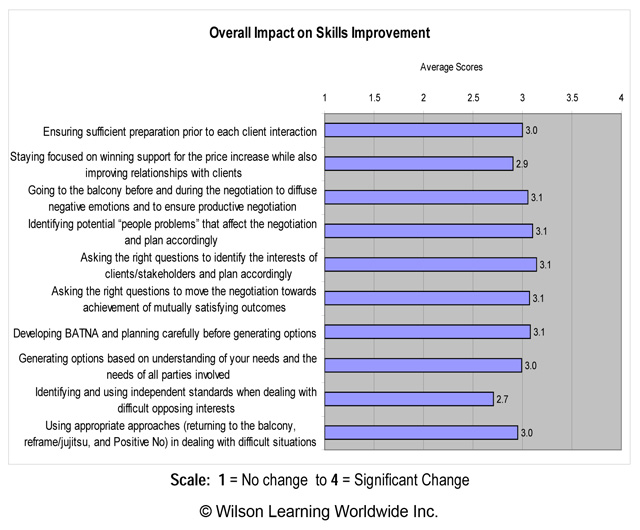
Our findings provided strong support for the value of NTY and this performance improvement process in improving the salespeople's negotiation skills and the company's overall business results.
Improvement in Negotiation Skills
The following graph shows the results of the participant survey on skill improvement. Participants were asked to indicate how much their negotiation skills improved as a result of the programme, from No Change (1) to Significant Change (4). As the graph shows, there was significant improvement in all skills. Eight of the ten skills received average ratings of 3.0 or above, and all ten were rated 2.7 or above.
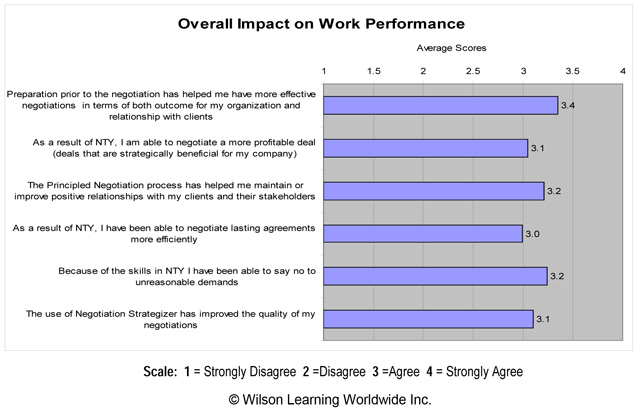
Impact on Work Performance
The new negotiation skills, in turn, had a significant impact on work performance. In the survey, we asked salespeople if there was a change in specific performance outcomes that resulted from participation in NTY. Participants agreed that the skills they learned in NTY had a positive impact on their performance outcomes. The results of the survey are shown in the graph at right. On average, salespeople agreed that all skills showed meaningful improvement.
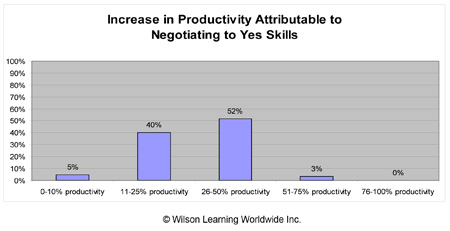
In another question, we asked the participants how much improvement in their work performance they would attribute to NTY. As shown in the graph at right, over half (52%) attributed 25–50% of their productivity improvement to NTY—a significant improvement when you consider all of the other factors that affect performance.
Financial Impact of NTY
Of course, one of the most important questions associated with any training and development effort is its impact on the financial performance of the organisation. We were able to explore this question through an in-depth analysis of selected sales opportunities.
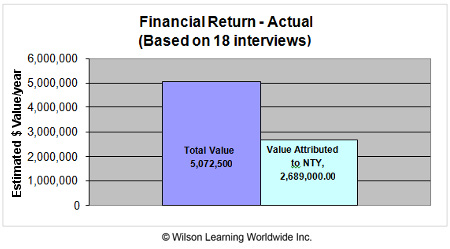
As part of the NTY improvement process, we asked each participant to complete a negotiation plan for a specific client opportunity. After the anticipated closing date of the sales opportunity, we emailed the participants asking them the status of the negotiation; 47 salespeople responded that their sale had in fact closed. We selected 18 opportunities on which to conduct in-depth interviews. In these interviews, we asked how the participants used the NTY skills, the effect of these skills on the sale, the total dollar value of the sale and the percentage of the sale they would attribute to NTY.
The graph at right shows the impact of NTY on those 18 sales opportunities. The total value of those sales opportunities was approximately $5 million. When asked the percentage of the sales they would attribute to their NTY skills, salespeople attributed approximately $2.7 million of that $5 million to their NTY skills (about 53%).
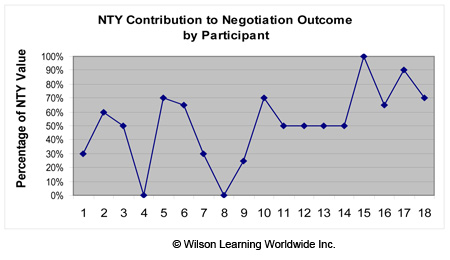
Of course, not all salespeople attributed the same amount of the negotiation outcome to NTY. The graph at right shows individual NTY contribution to the negotiation outcome, as reported by the 18 salespeople we interviewed. As you can see, they range from 0% to 100%, with an average of 53% of the final sale attributed to NTY skills.
Finally, while we do not have total actual costs associated with implementing the NTY development programme, it was estimated that about $2,000 was invested for each salesperson (combining the workshop costs, coaching sessions, travel, living expenses, evaluation and other miscellaneous costs). Thus, for this group of 18 salespeople, the estimated total cost of $36,000 returned $2.7 million in revenue, or a 75:1 ROI.
NTY Skills Having the Greatest Impact on Performance
Combining the results of the surveys and interviews gave us a clear picture of the impact of NTY skills. The skills that helped this group of salespeople the most in their negotiations were:
- The ability to step back from the negotiation to better understand the client's perspective and to manage their own emotions
- The ability to separate people problems from the real issues
- The ability to ask the right kinds of questions in order to identify the underlying issues and concerns
- The ability to anticipate what clients would do during difficult negotiations and develop alternative sets of actions if the negotiation failed
This was effectively summarised in the statement of one of the participants:
". . . we were certainly more aware of the participants from the client company and their stakes and possible positions. This helped immensely as we proceeded through the negotiation process and had favourable results."
Conclusion
This study showed that a sales performance improvement process centred on NTY had the intended impact:
- Better negotiation outcomes and increased sales revenue
- Improved client relationships for future business opportunities
- Better internal staff interaction
Although the study was conducted in a U.S.-based company in the environmental services industry, we believe that the findings have implications for organisations in other industries as well.
First, the findings provide support to the significance of the art of principled negotiation for salespeople in general. Strategic initiatives, like pricing increases, could easily affect client relationships and influence organisational performance negatively. This did not happen with this company! Clearly, having the ability to focus negotiations on sales objectives and, at the same time, build and nurture client relationships improved the performance of the salespeople. This, in turn, proved to be advantageous for organisational performance, improving revenue and increasing customer loyalty.
Furthermore, these findings provide support to the value of viewing training within the context of performance improvement. The NTY implementation went beyond a two-day negotiation workshop. A variety of Learning Transfer Technologies (LTTs), such as bi-weekly email tips and reminders, individual coaching and sales opportunity reviews, were applied. We also worked closely with top executives and participants' managers to ensure that NTY skills learned in the programme were incorporated into participants' daily work processes and supported. We believe that these types of support, beyond the two-day training workshop, made a significant contribution to the client's results.
In summary, the findings of our study indicate that implementation of NTY as part of a performance improvement initiative had a positive impact on the company's performance. NTY supported the company's strategic initiatives and contributed to the increase in salespeople's productivity. We believe that companies with a similar need to make salespeople part of their sustainable competitive advantage can benefit from NTY implementation as well.
Additional Resources
More information about the Negotiating to Yes programme is available from Wilson Learning Worldwide.








 Please complete this form to download Enhancing sales performance through negotiation skills.
Please complete this form to download Enhancing sales performance through negotiation skills.



